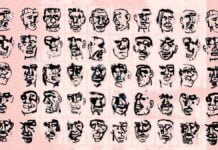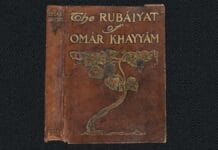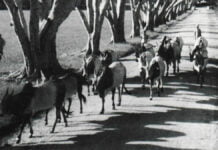World Malayali, by Dr K Ayyappa Panikar, is a typical modernist anti-romantic poem. It is a rich, layered poem exploring questions of identity, ancestry, and belonging in an interconnected world. The protagonist of the poem, “a white boy”, is looking for his roots. He passes generation after generation in many a land. The poem is composed in an open prose style. It is translated from Malayalam by the poet.
Summary
The poem begins with a “white boy” who is curious about his origins, asking, “Am I really a white boy?” and undertaking a symbolic journey backwards through generations to discover his roots. As he passes the first generation, he encounters human ancestors represented only by genes —a stark, anatomical image pointing to the primal, biological fact of human reproduction. When he demands the truth of them, they admit they are “not local people” and vanish, suggesting the migrant or displaced nature of all ancestry.
Moving to the second generation, he meets sperms —still refusing a clear answer, saying they come from the “neighbouring land,” showing that identity is already mixed, porous, and shaped by movement. In the third generation, he encounters chromosomes —fundamental genetic carriers —which convey only partial knowledge: they “come from another country,” offering no final certainty about one’s belonging.
At the fourth generation, he reaches a crossroads. Those he meets tell him “each of the four ways is a way,” but each points in a different direction. This powerfully suggests the conflicting narratives of heritage and the impossibility of a single, pure origin story. When he passes the fifth generation, he sees five-petalled flowers. He asks how five petals make one flower, and they explain it’s like five fingers on one hand, offering an image of unity in diversity, a model of how multiple elements can form a single identity.
As he moves beyond, he hears someone singing a song, but cannot identify the singer. When he demands the truth, the singers confess: “So many singers are we here; and from so many lands have we come.” This line highlights the multiplicity of voices and cultural influences that shape identity. Climbing to the seventh generation, he sees the rainbow with its seven colours. He asks how these different hues unite, and learns they are simply the result of clouds and sunlight—an analogy for cultural blending arising from natural interactions rather than any inherent division.
After the tenth generation, he can find no more ancestors in this abstract search. Instead, the narrative shifts to a vivid, earthy Malayalam village scene: a canal with a fisherman in his canoe, housewives buying fish. The fisherman departs without taking payment, and the housewife blushes. That blush travels “down from her feet like a root” and becomes a lotus bloom —linking sexual energy, fertility, and cultural rootedness in a strikingly sensual, symbolic image.
A bumblebee kisses the lotus and scatters its pollen in many lands, suggesting cultural exchange, migration, and hybridisation. The once-curious boy, having traced roots across lands and generations, realises that his roots are in the Malayalam soil. He returns “home” as a “World Malayali” —a person whose identity is both deeply local and irreducibly global. The poem closes by repeating the village scene, reinforcing the notion that rootedness is created through cultural exchange and generational transmission, rather than found in any fixed, pure ancestry.
Analysis
World Malayali is a brilliantly crafted, philosophical poem that combines folk imagery, sensual symbolism, and stark biological references to interrogate the meaning of identity in a postcolonial, globalised world. At one level, it is a quest poem —a journey backwards through generations in search of authentic origins. Yet Panikar undercuts the idea that such a quest can yield a singular, pure truth. Each generation refuses to confirm a stable “local” identity. Instead, they confess to migration, mixture, and partial knowledge. This approach critiques the notion of ethnic or racial purity, suggesting instead that human history is one of continual movement and exchange.
Panikar’s use of anatomical and genetic imagery —genes, sperms, chromosomes —is deliberately stark and unsentimental, reminding us that ancestry is biological, impersonal, and messy. Yet he balances this with rich cultural metaphors —the flowers, songs, rainbows —that celebrate the creative, unifying potential of diversity. The five-petalled flower, likened to five fingers, is a particularly effective metaphor for pluralism, showing how multiplicity can form a coherent whole.
The poem’s second half shifts from abstract ancestral searching to a rooted, sensuous scene in a Malayalam village. The canal, the fisherman, the housewives, the blush turning to a lotus —this vivid tableau grounds identity in lived, cultural practices. It reclaims the idea of rootedness, not as genetic or racial purity, but as the flowering of intergenerational, local, and embodied life. The blush that becomes a root and then a lotus is especially striking, linking sexual desire, reproduction, and cultural continuity in a deeply local image.
The bumblebee scattering pollen across many lands is a masterful symbol of cultural hybridity and diaspora: while the lotus blooms in one place, its essence travels, cross-fertilises, and transforms distant lands. In this way, Panikar acknowledges the real experience of Malayali migration —thousands working and living abroad, sending money and culture home, and shaping Kerala even as the world shapes them.
The poem also shows empathy towards the migrant experience. The white boy’s journey mirrors the questioning of many Malayalis abroad who wonder about their own identity and belonging. Panikar’s answer is both unsettling and comforting: there is no single “pure” root, but there is a cultural rootedness that can embrace complexity, mixture, and shared heritage.
Stylistically, the poem is remarkable for its blend of direct speech, vivid imagery, philosophical questioning, and folkloric storytelling. It transitions seamlessly from the clinical to the lyrical, reflecting the complex and layered nature of identity itself. The repetition of the canal scene at the end creates a cyclical, grounding effect, bringing the abstract search back to the lived soil of Kerala.
Theme
The central theme is the exploration of identity and roots in a globalised world. Panikar demonstrates that ancestry is complex and mixed, challenging the notion of pure, local origin. The poem suggests that being a World Malayali means embracing both local cultural roots and global connections, acknowledging migration, mixture, and shared human experience.
Imagery
The stark anatomical and biological images, such as genes, sperms, chromosomes, etc., strip ancestry to its biological basics, showing that beneath cultural differences, human beings share common, universal origins. It also demystifies the idea of racial or cultural “purity,” emphasising that identity is fundamentally shared and mixed, and that searching for a single, pure root is futile.
The five-petalled flower represents unity in diversity. Just as five fingers make one hand or five petals make one flower, different cultural influences and ancestors combine to form a single identity. This metaphor promotes the idea of harmonious pluralism as the foundation of a sense of belonging.
The rainbow, with its seven colours, is a natural symbol of diversity, forming a unified whole. It shows that variety can coexist beautifully without erasing differences. The explanation that clouds and sunlight form it suggests that identity, like the rainbow, emerges naturally from interaction and mixing.
The bee pollinating the lotus and spreading its pollen to many lands represents cultural exchange and migration. It suggests that identity grows through movement, sharing, and adaptation. This imagery celebrates the global spread of Malayali culture while maintaining a deep connection to its local roots.
Encounter at the Crossroads
The crossroads symbolise confusion and multiplicity in ancestry. The four paths offering different directions suggest that there is no single truth or simple answer about one’s origins. It reflects the complexity of cultural and personal identity, which is shaped by many histories and choices.
Importance of the Village Scene
The village scene grounds the poem in Kerala’s cultural reality. The intimate exchange between the fisherman and the housewife, leading to the blush that grows into a lotus, symbolises fertility, rootedness, and cultural continuity. It shows that true belonging is created through lived, shared, sensual, and local experiences, rather than abstract notions of ancestral purity.
Tone and Style
The tone is both philosophical and ironic, moving between clinical biological description and lyrical cultural imagery. The style is vivid and symbolic, employing striking metaphors such as flowers, rainbows, bees, and lotuses to convey complex ideas about identity, belonging, and cultural hybridity in an accessible and memorable way.
Balancing the Local and the Global
The poem begins with a universal, abstract quest for roots that spans generations and lands but ends in a specific Malayalam village scene. This movement from the global to the local shows that while global migrations and mixtures shape identity, it is ultimately lived and rooted in particular places and cultures, making the World Malayali both a citizen of the world and a child of Kerala.
World Malayali refers to someone who recognises their deep cultural roots in Kerala while also accepting their global connections and influences. It is an identity that encompasses both the local and the international, acknowledging the blend of traditions, migrations, and shared human experiences that shape Malayalis worldwide.
The poem rejects the notion of a pure or singular identity. Through ancestors admitting migration and the metaphors of crossroads, flowers, and rainbows, Panikar shows that all identities are hybrid, layered, and shared. The poem argues for embracing mixture and complexity as the true essence of human heritage.
World Malayali is both a celebration and a critique: it celebrates Kerala’s openness to the world, the adaptability and cosmopolitanism of its people, while critiquing simplistic notions of pure ancestry or cultural isolation. It proposes that to be Malayali today is to be “World Malayali”: rooted locally but shaped by and contributing to the world.































World Malayali by Dr K Ayyappa Panikar
The white boy is curious:
“Am I really a white boy?”
Trying to look for his roots,
he started with a root.
When he passed the first generation,
he saw a handful of genes.
“Tell me who I am; whoever you be,
you must tell me the truth.”
“We are not local people,” they said,
and vanished in a flash,
Then he passed the second generation,
The sperms he encountered.
Will not go away from you,
You tell me who you are.”
“We are from the neighbouring land;
and so you leave us alone.”
Thus he passed the third generation,
and came upon three chromosomes.
“Till you tell me where you are from,
I will not let you go.”
“We have come from another country;
that is all we know.”
Thus, passing the fourth generation,
he arrived at a crossroads,
and asked the ones he met:
“What is the truth of the original root?”
“Each of the four ways is a way”:
and each one told him a different way-
When he went past the fifth generation.
five-petalled flowers he came across.
“O flowers, you must tell me how
five petals form a single flower.”
“Like five fingers on a single hand,
five petals make a single flower.”
As the fifth generation passed by,
someone he heard singing a song-
“Unless you tell me who is singing,
I will not go from here,” he said.
“So many singers are we here:
and from so many lands have we come.”
As he went up the seventh generation,
He saw the rainbow of seven colours.
“How did you, how did you. tell me,
how did you link these Seven hues?
“The clouds and the rays of the sun:
these seven colours know nothing else.”
He could not meet the eighth or ninth
or tenth generation anywhere.
After he passed the tenth generation
he came to an upcountry village:
in the heart of the village was a canal:
in that canal was a fisherman ina canoe:
at the wharf in front of each house
stood the house-wife to buy fish:
Without collecting the price of the fish,
the fisherman goes; the house-wife blushes;
that blush goes down from her feet like a root
and from that root a lotus blooms:
“The flower smells sweet,” hums the bumbic-bee;
he kisses the flower and flutters around,
In many a land he scatters the pollen,
turning the land of hills into may lands.
Looking for the roots in many a land,
the white boy finally found his roots.
He found the root of his Malayalam land
and went back home as a World Malayali.
ലോകമലയാളി
സായിപ്പുകൂട്ടിക്കൊരാശങ്ക:
സായിപ്പുതന്നെയോ താൻ?
വേരുകൾ കണ്ടുപിടിക്കുവാനായൊരു-
വേരും കൊണ്ടു തിരിച്ചു
ഒന്നാം തലമുറ പിന്നിട്ടപ്പോൾ
ഒരു പിടി ജീൻസിനെ കണ്ടു:
ആരാണു ഞാനെന്നു ചൊല്ലേണം നിങ്ങ-
ളാരാകിലും സത്യം ചൊല്ലേണം.
“ഞങ്ങളീ നാട്ടുകാരല്ലെ”ന്നു ചൊന്നവർ
മിന്നിപ്പിടഞ്ഞു മറഞ്ഞു
രണ്ടാം തലമുറ പിന്നിട്ടപ്പോൾ
രണ്ടു ബീജങ്ങളെ കണ്ടു.
“നിങ്ങളാരെന്നു പറയാതെ
നിങ്ങളെ ഞാൻ വിട്ടു പോകില്ല.”
“ഞങ്ങളയദേശവാസികളാകയാൽ
ഞങ്ങളെ വിട്ടു നീ പോകൂ.”
അങ്ങനെ മൂന്നാം തലമുറ പിന്നിട്ടു
മൂന്നു ക്രോംസോമിനെ കണ്ടു
“ചൊല്ലുക നിങ്ങളെവിടെ നിന്ന്?
ചൊല്ലാതെ ഞാനിന്നു പോകില്ല.”
“ഞങ്ങൾ മറുനാട്ടുകാരെന്നു മാത്രമേ ഞങ്ങൾക്കറിയാവതുള്ളൂ.”
നാലാം തലമുറ പിന്നിട്ടപ്പോൾ
നാല്ക്കവലയ്ക്കൽ ചെന്നെത്തി
നാലു പേരോടു ചോദിക്കാൻ തുടങ്ങി
“നാരായവേരിൻ്റെ നേരേത്?”
“നാലു വഴിയും വഴിതന്നെ,” വഴി തന്ന
നാലുപേരും നാലു വഴി ചൊല്ലി.
അഞ്ചാം തലമുറ പിന്നിട്ടു
അഞ്ചിതൾ പൂക്കളെക്കണ്ടു.
“അഞ്ചിതളൊരു പൂവിലെങ്ങനെ വന്നെന്നു
ചൊല്ലണം പൂക്കളേ നിങ്ങൾ.”
“അഞ്ചു വിരകളൊരു കയ്യിലായപോൽ
അഞ്ചിതളൊരു പൂവിലൊത്തല്ലോ.”
ആറാം തലമുറ കൂടി കടന്നു
ആരോ പാടുന്ന പാട്ടു കേട്ടു
“ആരാണു പാടുന്നതെന്നു പറഞ്ഞാലേ
ഞാനിവിടം വിട്ടു പോവുള്ളൂ.”
“ഒരുപാടു പേരുണ്ടു ഞങ്ങളിപ്പാട്ടുകാർ
ഒരുപാടു നാടുകൾ വിട്ടുവന്നോർ”
ഏഴാം തലമുറയേറി ചെല്ലുമ്പോൾ
ഏഴു നിറത്തിൽ മഴവില്ല്.
“എങ്ങനെയെങ്ങനെ നിങ്ങളീ ഭംഗികൾ
എങ്ങനെ കൂട്ടിയെടുത്തു?”
മേഘങ്ങൾ സൂര്യൻ്റെ കിരണങ്ങൾ-മറ്റൊന്നും
ഏഴു നിറങ്ങൾക്കറിയില്ല!
എട്ടാം തലമുറ കിട്ടിയില്ലൊമ്പതും
പത്തും തലമുറ പിന്നിട്ടു.
പത്താം തലമുറ പിന്നിട്ടപ്പോൾ
എത്തിപ്പെട്ടൊരു കുഗ്രാമം.
ഗ്രാമത്തിൻ മാറിലൊരു കൊച്ച് തോട്.
തോട്ടിൽ തോണിയിൽ മീൻകാരൻ.
മീൻ വാങ്ങുവാനായി വീടിൻ്റെ കടവത്തു
വീട്ടമ്മമാർ വന്നു നില്ക്കുന്നു.
മീനിൻ്റെ വില വാങ്ങിടാതെ പോകുന്നു
മീൻകാരൻ; വീട്ടമ്മമാർക്കു നാണം
ആ നാണം കാലിലെ വേരായിറങ്ങുന്നു
വേരീന്നു താമര പൂക്കുന്നു
പൂവിന്നു മണമൊന്നു പാറുന്നു തേനീച്ച
പൂവിനെപ്പുൽകിപ്പറക്കുന്നു
പലനാട്ടിലതു പോയി വിതറുന്നു പരാഗങ്ങൾ
മലനാടു പല നാടായി മാറുന്നു.
വേരു തേടിപ്പലനാടു കടന്നപ്പോൾ
സായിപ്പുകുട്ടിക്കു വേരു കിട്ടി.
മലയാളനാടിൻ്റെ വേരു കിട്ടി ലോക –
മലയാളിയായി തിരിച്ചെത്തി.